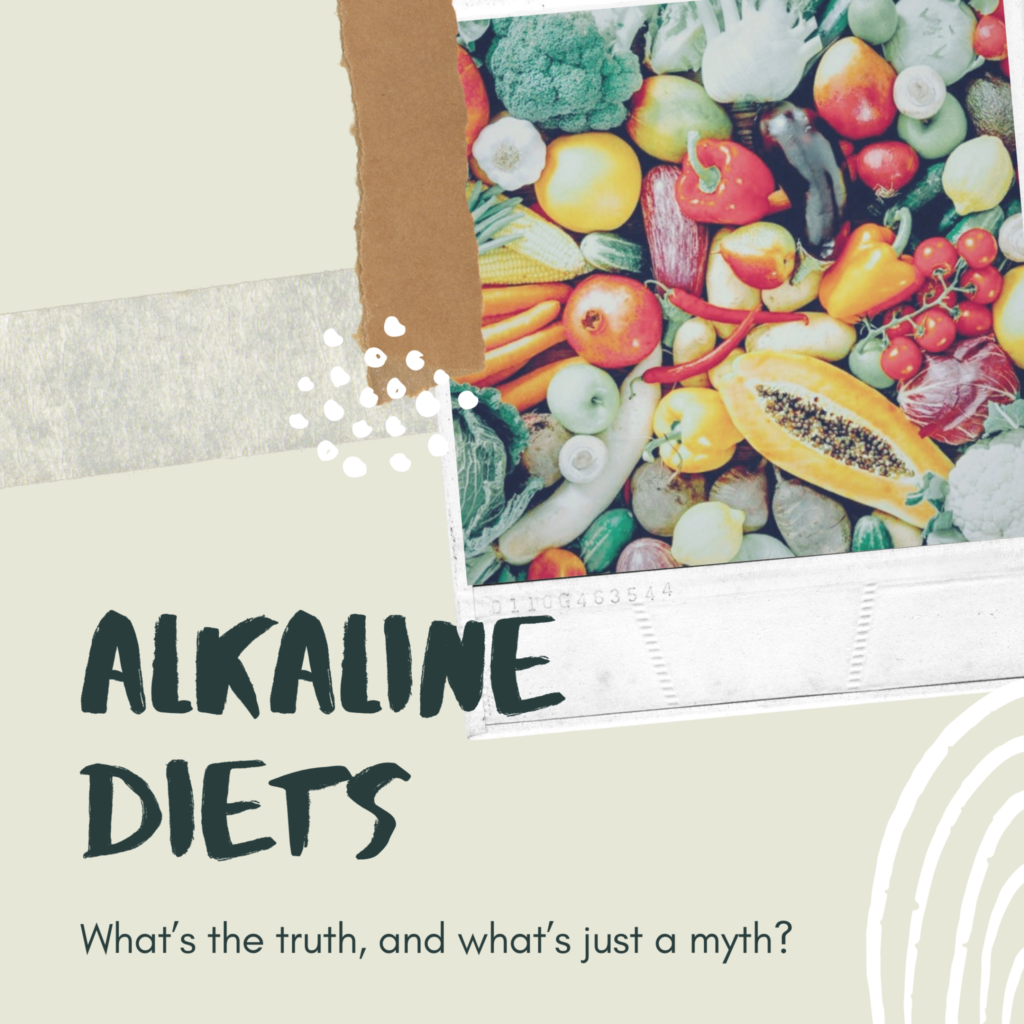It’s been said that this diet is a way to improve health by eating foods that effect the pH balance in the body. Claims in the media say it can cure cancer, reverse obesity, rebuild your tissue, give abounding energy and mental clarity. But is this true? I think we all know the media can have a tendency to sensationalise.
The idea behind this diet is based on the pH of the ash that is left when food is burned. Meat, chicken, fish, eggs, cheese and bread produce acidic ash when burned, whereas most fruits and vegetables produce ash that is alkaline. However, our bodies don’t physically ‘burn’ food to ash. Other methods historically included using calculations based on the mineral content of foods to determine whether it was overall more acid producing. Again foods such as grain products, meats, dairy, fish, and beer have higher acid-forming potential than fruit, veg, potatoes and wine.

We now know that our bodies have mechanisms in place to keep our blood in a tight pH range around 7.4. With some medical conditions, you can go in to acidosis (you pH drops low) or alkalosis(your pH increases) but diet alone will not treat these. So, no matter how much meat and cheese you eat, it will not make your blood pH go acidic, nor will it become alkaline if your breakfast lunch and dinner consist of purely vegetables. It may however change the pH of your urine but this is not the same.
So what actually happens when we eat acidic foods?
As always the body is extremely clever and has its own built in system to bring things back to normal (homeostasis). So your kidneys will excrete the excess acid; your bones will act as a buffer system releasing alkaline minerals, your liver will help to balance the acid, and the lungs will convert the acid, and breath it out as carbon dioxide. It only becomes a problem when the body is not working properly. For example if your kidneys or lungs are sick. Asthma, severe vomiting, diarrhoea and alcohol abuse are examples of conditions that can lead to your body not doing it’s job.
What does the research say?
Some studies have shown an increased risk of osteoporosis with eating acidic foods because the bones are used to balance out the pH of the blood.
Other human studies showed that an acidic diet (bread, cheese, peanuts, meat, chocolate) increased bone breakdown 20% more than an alkali diet (high in vegetables, fruits, and moderate amounts of milk). It also greatly increased how much calcium was lost by 75%.
A study in rats showed the lower the pH of the blood (even tiny changes) can result in significant increases in the activity of bone breakdown.
So what does this mean? It’s conflicting and with all research we can’t take the results as black and white. There are always limiting factors and other things to take into account. Some studies are observational or small in number or not even conducted on humans.
What does seem to be emerging is that fruit and vegetables that fruit and veggies are good for bone health. This is not just due to the the effect of the acid-alkali balance, but all the other benefits within the fruits and vegetables such as fibre, specific vitamins or phytoestrogens or the impact of all these together.
Regarding the other health claims, so far no evidence has been found for the alkaline diet on preventing or curing obesity, cardiovascular disease, type 2 diabetes, cancer, depression, yeast overgrowth or cellulite.
To summarise:
The benefits of increasing the amounts of fruit and vegetables in your diet are numerous, and that may include protecting bone health.. In addition, reducing the amount of saturated fat in your diet from fatty meats and dairy products will benefit your heart health and reduce risk of certain types of cancers. But the main message here is that you don’t need to keep count and control over every single thing you eat or drink, as your body does a wonderful job of keeping you in balance. Instead, make small changes and keep them over time, such as:
- Have meat-free meals a few nights a week
- Snack on a small handful of unsalted nuts instead of a bag of crisps
- Carry fruit with you to work
- Sneak in an extra portion of veg in to your regular meals by chopping up mushrooms/carrots/celery extra small or even blending
- Or bulk out your meals with lentils. Not only will these methods keep you fuller for longer, but you’ll benefit from the added vitamins and minerals
- Enjoy alcohol in moderation (14 units, over 5 days a week)
- Switch from white bread/pasta to wholegrains or wholewheat
Huge thanks to Naomi Leppitt, RD for her help with this post.
References:
Arnett & Dempster 1986 Endocrinology; 119:119-124
Buclin et al 2001 Osteoporosis Int 12;493-499
Hamidi et al 2011 Osteoporosis Int 22:1681-1693
Lanham-New 2006 Am J Clin Nutr 2006;83:1254–5
Alkaline Diet – What is Alkaline Acid Diet